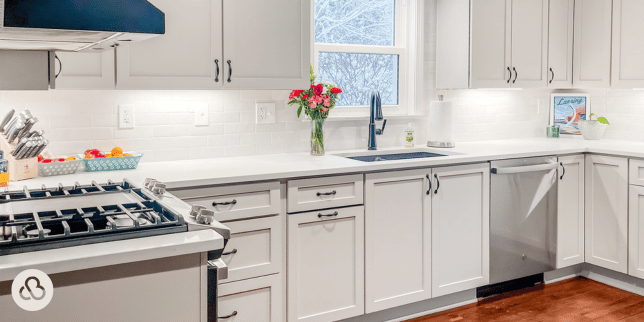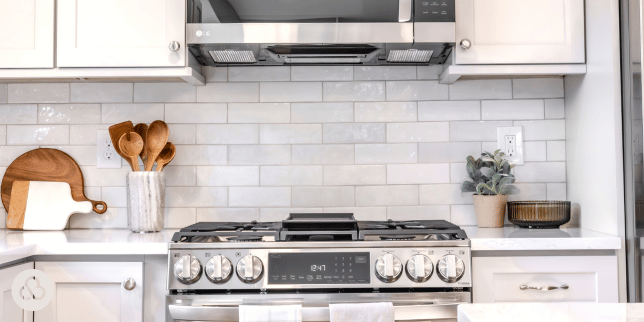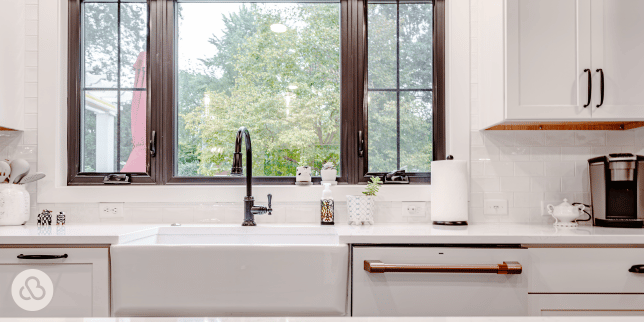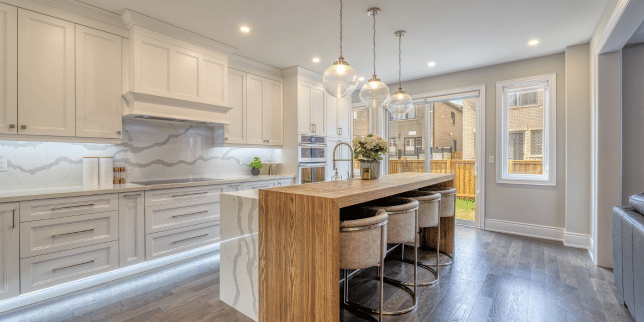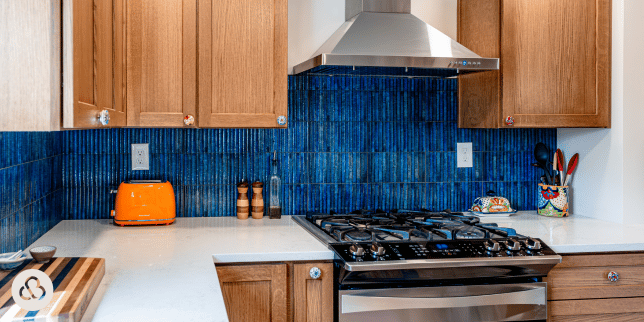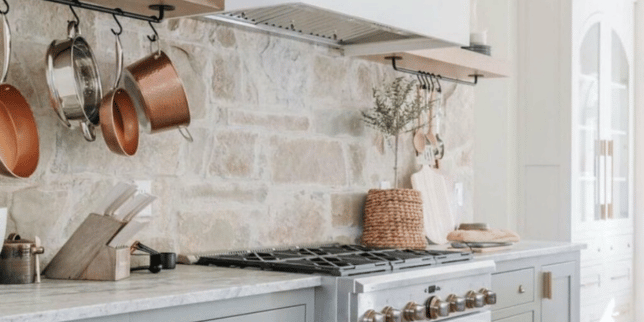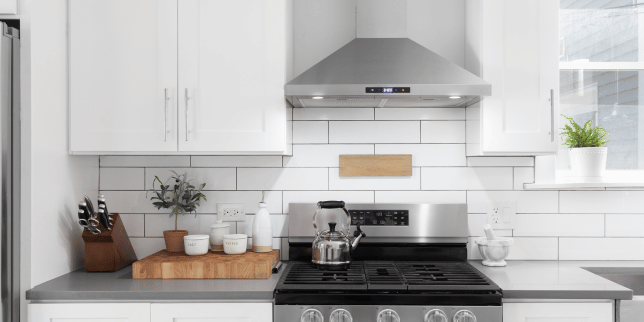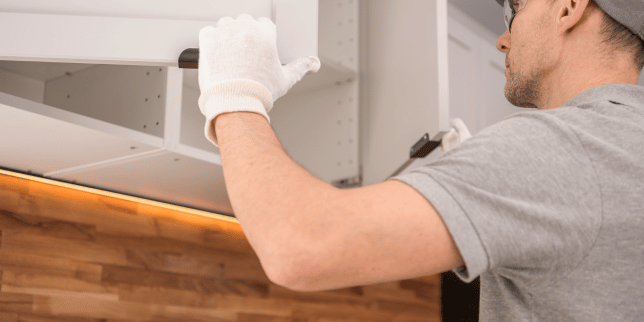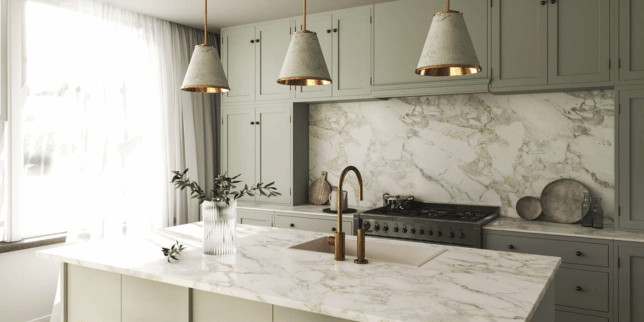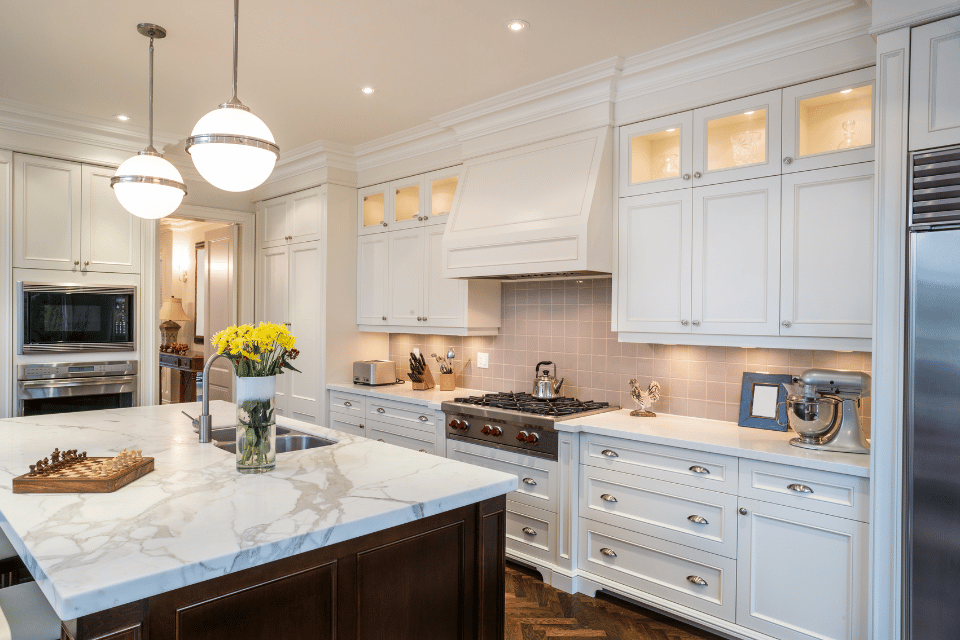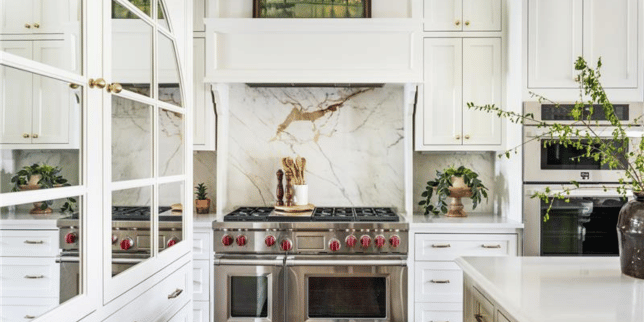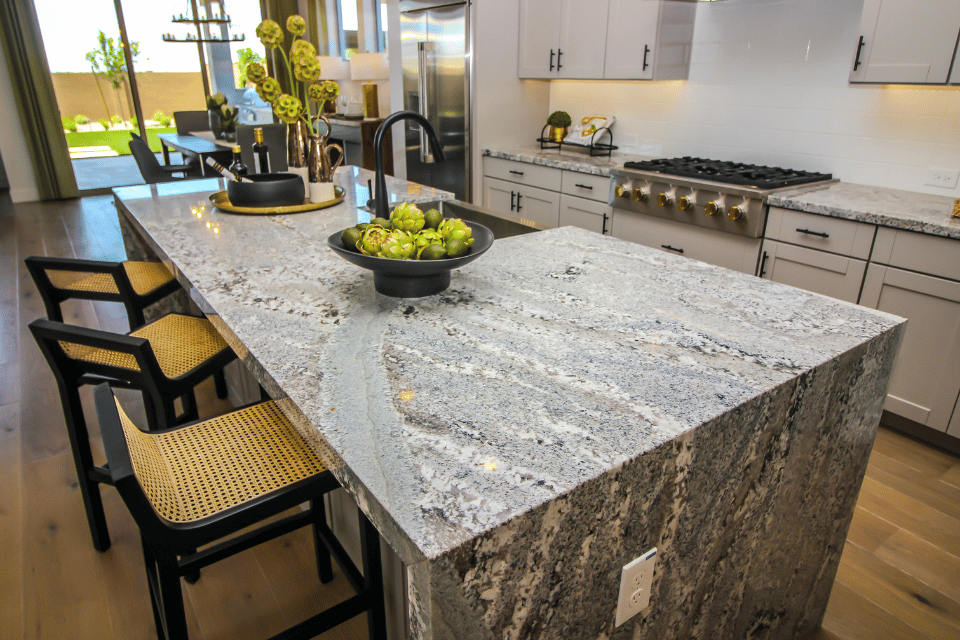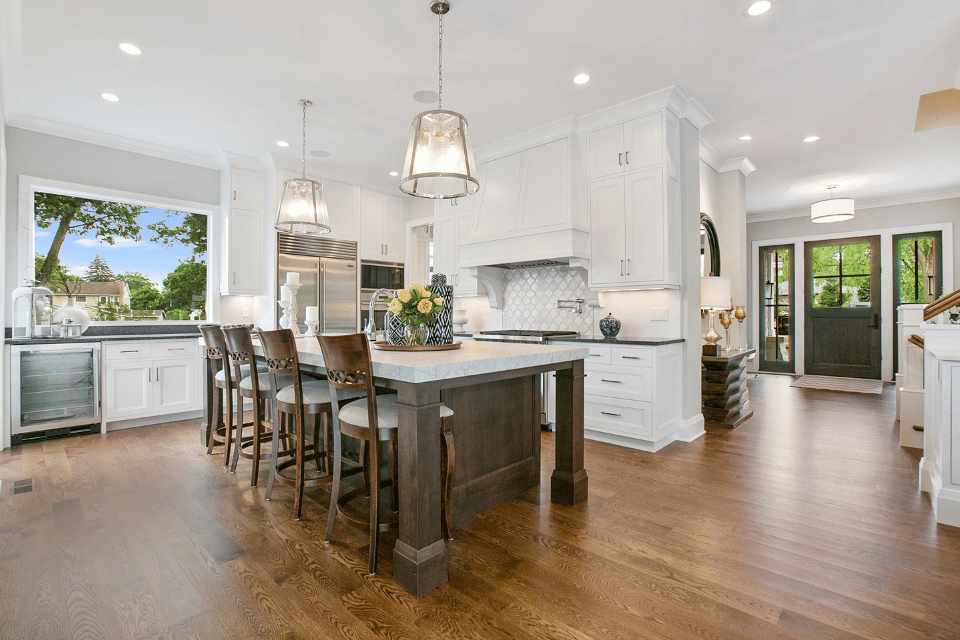Shiplap vs. Tile Backsplashes: Enhancing Your Kitchen’s Aesthetic
January 16th, 2025
5 min read

When it comes to designing your dream kitchen, the backsplash plays a crucial role in both form and function. With so many options available, deciding between shiplap and tile can be a tough choice. Are you drawn to the warmth and texture of wood, or do you prefer the timeless durability and variety of tile?
At Custom Built, we understand the importance of blending aesthetic appeal with practical needs. Whether you're looking to create a cozy farmhouse feel or a sleek, modern design, we’re here to help you explore both options and find the perfect fit for your space.
Let’s dive into the pros and cons of shiplap and tile backsplashes to help you decide which will enhance your kitchen's aesthetic and meet your functional requirements:
- Pros of Shiplap Backsplashes
- Warm and Customizable Aesthetic
- Cost-Effective Solution
- Textured Appeal
- Cons of Shiplap Backsplash
- Moisture Susceptibility
- Higher Maintenance
- Potential for Gaps
- Pros of Tile Backsplashes
- Design Variety
- Durable and Water-Resistant
- Versatile Aesthetic
- Cons of Tile Backsplashes
- Higher Cost
- Time-Intensive Installation
- Grout Maintenance
(Header Shiplap Backsplash PC: Houzz)
Shiplap Backsplashes
PC: Houzz
Shiplap, with its signature wood paneling, offers a warm and inviting touch to any space. Installed either vertically or horizontally, it’s a versatile choice that can adapt to a variety of styles depending on the wood type, finish, and surrounding décor.
Pros of Shiplap Backsplashes
1. Warm and Customizable Aesthetic
PC: The Spruce
Shiplap doesn’t have to mean rustic. While knotty wood with a stained finish evokes a farmhouse feel, vertical shiplap painted in light tones paired with coastal décor can create a breezy, beachy vibe. The surrounding elements, from hardware to color choices, significantly influence the final look.
2. Cost-Effective Solution
PC: DecorPad
Shiplap is often more affordable than tile, both in material and installation. Its straightforward installation process requires less time and effort compared to the precision and care needed for tile layouts, making it a budget-friendly choice.
3. Textured Appeal
PC: Pinterest
The natural texture of wood adds depth and interest to your kitchen. For maximum impact, shiplap works best on larger surfaces, such as full or half walls, where its proportions shine.
Cons of Shiplap Backsplashes
1. Moisture Susceptibility
Shiplap isn’t ideal for areas exposed to constant water splashes, like behind a sink or stove. While sealing can provide some protection, it’s best to install a standard 4" backsplash of your countertop material below the shiplap to shield the wood from moisture. Shiplap works better for accent walls, coffee bars, or prep areas away from water exposure.
2. Higher Maintenance
Being wood, shiplap requires a stable environment to avoid damage from humidity changes. Painted finishes may chip over time, necessitating sanding and repainting for a fresh look.
3. Potential for Gaps
Wood is a natural material that can warp or shift, creating small gaps over time. These imperfections are manageable with a professional installer but can pose challenges for DIY projects.
Tile Backsplashes
Tile is a classic backsplash material, prized for its durability, water resistance, and design versatility. From sleek subway tiles to intricate mosaics, tile backsplashes can suit virtually any kitchen style.
Pros of Tile Backsplashes
1. Design Variety
Tiles come in countless shapes, sizes, colors, and patterns, allowing for endless customization to match your kitchen’s aesthetic. Whether you prefer a sleek modern look, a rustic charm, or a bold statement, tiles offer the versatility to bring your vision to life.
2. Durable and Water-Resistant
Perfect for areas prone to splashes and spills, tiles are easy to clean and maintain. Their non-porous surfaces protect walls from damage, making them ideal for functional spaces like sinks and stoves.
3. Versatile Aesthetic
Whether you’re going for modern minimalism, vintage charm, or bold patterns, tile can deliver a look that aligns with your vision. Plus, its durability and low-maintenance nature make it a practical choice for busy kitchens.
Cons of Tile Backsplashes
1. Higher Cost
Tile materials and installation can be more expensive than shiplap, especially for intricate patterns or custom designs. However, the investment often pays off in longevity and the added value it brings to your home.
2. Time-Intensive Installation
Installing tile requires careful planning, precise placement, and grouting, which can make the process more labor-intensive. This level of detail ensures a polished, professional finish that enhances both the durability and aesthetic appeal of the space.
3. Grout Maintenance
Grout lines can be a maintenance consideration, though modern grout formulations and thinner grout lines have improved ease of cleaning and durability. Regular sealing and proper care can further extend the lifespan and appearance of the grout, keeping your tile surfaces looking pristine.
How to Choose the Right Backsplash for Your Kitchen
Choosing between shiplap and tile for your kitchen backsplash comes down to several factors: your aesthetic preferences, functionality needs, and the overall design of your space. Here’s how to determine which option is best suited for your kitchen:
1. Consider Your Kitchen Style
Shiplap works wonders in creating a cozy, rustic, or coastal vibe. If you’re aiming for a farmhouse aesthetic or want to introduce warmth through natural wood tones, shiplap could be the perfect fit.
On the other hand, tile offers an array of design options, from sleek and modern to bold and traditional, making it a versatile choice for nearly any style.
2. Assess Your Space’s Functionality Needs
Functionality plays a significant role in deciding between shiplap and tile. If your kitchen sees frequent splashes from cooking or washing dishes, tile is a better option due to its water resistance and ease of cleaning.
Shiplap, while visually appealing, is not as practical for areas exposed to high moisture, unless you’re willing to maintain it regularly.
3. Think About Maintenance
Tile is generally easier to maintain, especially when it comes to cleaning. If you’re looking for a low-maintenance backsplash that can withstand frequent wipe-downs without showing wear, tile may be the better choice.
Shiplap requires more upkeep, as it can absorb moisture and may need repainting or resealing over time, especially if used behind a sink or stove.
4. Factor in Your Budget
If cost is a concern, shiplap may be a more budget-friendly option, especially considering both the material and installation. Tile, while more expensive upfront, can add long-term value to your kitchen due to its durability and timeless appeal.
5. Evaluate Your Installation Space
Shiplap is best used for larger wall spaces or accent areas, such as a coffee bar or prep station. It’s ideal for creating texture and interest but may not suit narrow or high-moisture areas.
Tile, with its precision and variety in sizes, is well-suited for the more traditional backsplash areas, particularly behind sinks, stoves, and counters.
Ultimately, the right choice depends on balancing the aesthetic you want with the practical needs of your kitchen.
Next Steps to Remodeling Your Kitchen Backsplash
Choosing between shiplap and tile for your kitchen backsplash is a decision that can significantly impact both the style and functionality of your space. Shiplap brings warmth, texture, and character, while tile offers durability, versatility, and easy upkeep.
By evaluating your aesthetic preferences, maintenance needs, and budget, you can find the perfect option for your kitchen.
At Custom Built, we're committed to helping you make the best choice for your home and lifestyle.
Let us help you transform your kitchen into the space you've always wanted. Contact us today to start planning your backsplash makeover.
Now that you know more about the pros and cons of shiplap and tile backsplashes, let’s explore design ideas you to include in your project, how much your project will cost, and how long it’ll take to finish with Custom Built:
- 10 Features Every Luxury Kitchen Remodel Should Have - Discover trending appliances and design choices you should include in your project.
- How Much Does a Luxury Kitchen Remodel Cost in Lansing, Michigan? - Explore cost estimates, a budget breakdown, and factors that affect the cost of your luxury kitchen remodel.
- How Long Does a Luxury Kitchen Remodel Take to Get Finished with Custom Built? - A high-level overview of how long your project will take to complete during Custom Built’s Proven Process.
Elysiah is a skilled interior designer at Custom Built, combining professional experience and a degree from Kendall College of Art and Design to create thoughtful, functional spaces for clients. She applies the latest industry principles to both residential and commercial projects while supporting the team with essential project coordination.
Topics:







